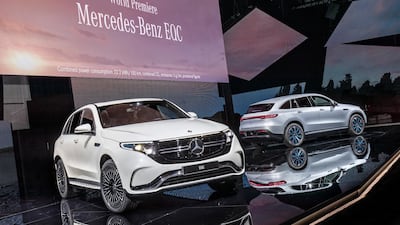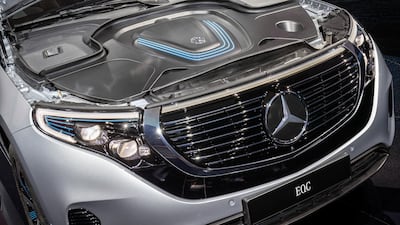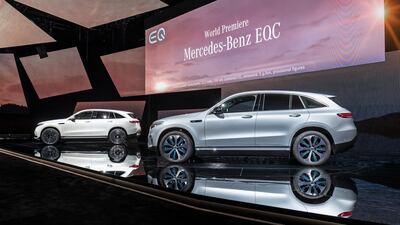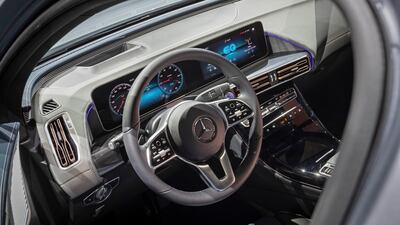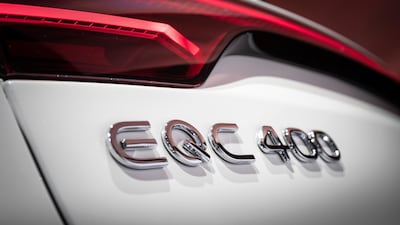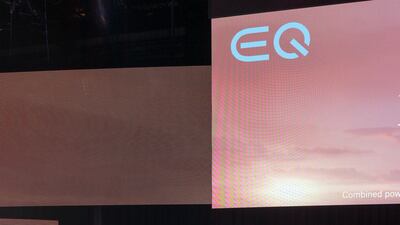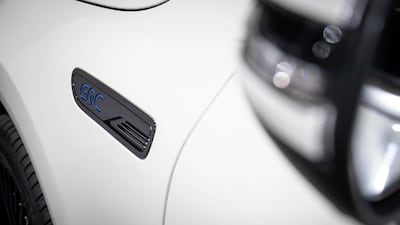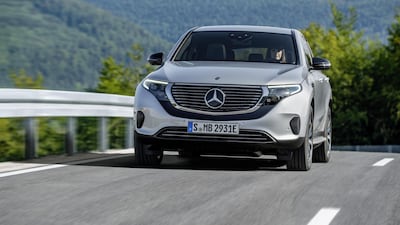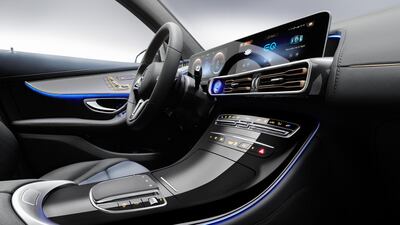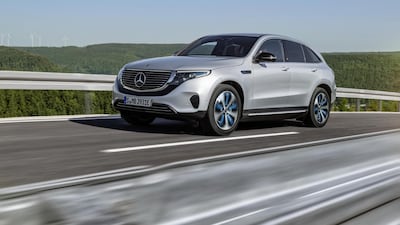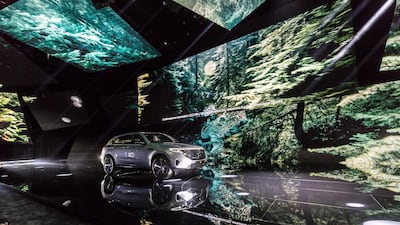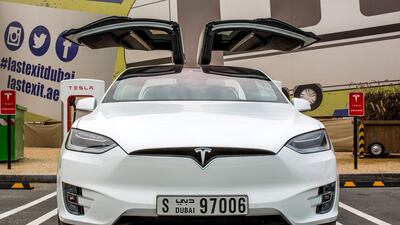Before this week, when you Googled “EQC”, the first results were for the Earthquake Commission. Aside from upping the search ranking for its first all-electric SUV, Mercedes-Benz will be hoping that the launch of its own EQC will produce a similarly seismic impact.
Merc is the latest company to enter the electric SUV arms race, something that looks set to reach full velocity inside the next year, with major players such as Audi, BMW and Volvo also zeroing in on zero-emissions sports-utility vehicles.
Fittingly, for the EQC's world premiere, we’re in Stockholm, which habitually occupies the Top 10 rankings of the greenest cities in the world, and was even the inaugural European Green Capital in 2010. Its expansive forests and pristine waterways certainly don't deserve to be sullied by the ceaseless burning of fossil fuels.
It's in such a landscape, on Varmdo – one of 14 islands that make up the archipelago on which the Swedish capital sits – that the EQC has its official unveiling. It's about half an hour from central Stockholm, but in a move slightly at odds with the electric intent of its latest charge, Mercedes takes our group to the site on a sizeable motorboat.
Our first impressions of the crossover SUV beneath the just-removed car covers? Well, it doesn’t look as remarkable as its futuristic Concept EQ version, nor indeed as beautiful as direct competitors such as Tesla’s otherworldly Model X or the Jaguar I-Pace – the latter of which is the best new car I have driven this year, so far.
But the landscape is changing. Until now, the desirability of electric vehicles has almost transcended category – put simply, there have barely been enough options to pick and choose within an individual segment. To select an EV as your daily driver was to make a statement of green intent across the board, rather than specifying: “I need a car to fit my family of five.”
So the potential of a carmaker on the scale of Mercedes entering the electric market, after 130 years of producing cars with combustion engines, shouldn't be underestimated. After all, the German giant sold 2.3 million cars around the world last year, and plans to have seven fully electric models in total by 2022, with the EQC's successor already about to start development. If it could turn even 10 per cent of its total annual sales into EV purchases, in one year, it would be in the ballpark of the number of cars Tesla has sold in its entire history. Electric-car production is about to hit the mass market.
The nearest petrol equivalent to the EQC is the GLC, although this is no cut-and-shut case of lobbing a battery into an existing internal-combustion car. This is the first of many vehicles in the overall range, EQ, which will feature SUVs and saloons. EQ, we are repeatedly told to somewhat befuddled looks, stands for “electric intelligence” – it's a riff on IQ, clearly, although the smartness of it all appears a little lost in translation.
Quietly, Mercedes has been doing the groundwork for this for more than a decade, via parent company Daimler, which also runs the Smart brand – pocket-sized city car the Fortwo Electric Vehicle began development in 2006.
While that car had a range of about 135 kilometres, though, the EQC is an entirely different proposition, with a claimed range of “more than 450km” from its 80kWh battery. Although Merc was a little evasive when quizzed on the exact details of compatible charging stations in the UAE, it is equipped for public charging, with a projected charing time of from 10 to 80 per cent full in less than 40 minutes. It also comes with a wall box that can be installed at your home for overnight juice refills, with about 10 to 11 hours required to reach capacity. The Mercedes ME app is due to offer seamless payment options, too, as well as planning your routes, allowing for any necessary charging stops along the way, plus the sweat-avoiding ability to pre-set your climate control – something of a lifesaver in the hottest UAE weather extremes.
There is also, as you might expect, plenty of clever technology at work within the car. Semi-autonomous elements ensure, for example, that in a tailback, the EQC will keep itself off-centre to leave room for the emergency services to pass.
The lithium-ion battery, which is floor-mounted below the passenger compartment and made up of 384 cells in six modules, powers motors on both axles for all-wheel drive that has intelligent torque distribution. The battery is protected from impacts, water and dust, and the high-voltage system will shut down in milliseconds in the event of a crash.
With controls behind the steering wheel, there are five modes for regenerative driving, to pump power back into the battery without hooking it up to a charger, with “D--” (or D minus minus) allowing for one-pedal driving a la forerunners such as the Nissan Leaf. Ease off the accelerator and the car immediately brakes, with the friction generated being used to recharge the battery.
Merc is confident in its power source: the EQC's battery will come with an eight-year/160,000km warranty, and it fully expects the battery to live longer than that.
As usual with EVs, the torque available is both instantaneous and impressively high: 765Nm, in this case. To equal that in a petrol Mercedes, you would have to invest in a high-end, high-performance AMG model. The other vital statistics are similarly capable: 0-to-100kph in 5.1 seconds, 408hp and a limited top speed of 180kph.
________________
Read more:
Green light for competitive driving with launch of 2019 Electric Vehicle Road Trip Middle East
Electric update of Jaguar E-Type goes into production – in pictures
Is this the most important hybrid ever to be sold in the UAE?
Latest from The National's Motoring section
________________
Despite our initially underwhelmed verdict on the exterior visual impact, a handful of styling innovations do grab the attention, most notably the glowing Mercedes star up front, “eyebrow” day-running lights at the top of the main headlamps, and the futuristic light bar that extends across the entire width of the boot.
The interior is suitably swish, with the expansive dash display deliberately contrasted by knowingly analogue touches, such as air vents inspired by circuit boards. In a further environmental effort, recycled textiles are used in the seat fabric.
With voice controls that will recognise different occupants of the car, Merc also sees the EQC as the first step towards a society that shares cars rather than individually owns them.
Although precise pricing and on-sale dates are yet to be confirmed, expect to see the EQC in the UAE by mid-to-late 2019. By that time, it will have added hot-weather testing in Dubai to already completed winter exploits in northern Sweden and a plethora of other environmental extremes around the world. Also by that juncture, Mercedes, already the pre-eminent force in the gas-guzzling Formula One World Championship, will have thrown its weight behind electric racing's top series, Formula E.
As one Merc executive said at the EQC launch of Tesla's trailblazing work in the EV world: “A snowball has been thrown and an avalanche is coming down the mountain.” A decade ago, that might have summed up an electric SUV's relevance to the UAE. Now, however, the EQC appears to be heralding a movement that seems set to change our roads for the better – and not in the far-distant future, either.
The competition
The market for electric SUVs is about to become considerably more crowded. Here is what the Mercedes EQC is up against:
Audi e-tron
The public bow for this full-size SUV is hot on the heels of the EQC's, with the e-tron's unveiling in San Francisco in mid-September.
BMW iX3
The Concept iX3 was presented for the first time at the Auto China 2018 show in Beijing in April. The real thing isn't due until 2020, but BMW is already taking orders in Germany.
Hyundai Kona Electric
Already on sale in other locations around the world, the Kona Electric is a futuristic update of the existing SUV is set to be wallet-friendly – perhaps as little as Dh150,000, based on global price tags.
Jaguar I-Pace
The Jaguar I-Pace, which makes it debut this year, has earned rave reviews and has beaten the majority of its rivals to market.
Tesla Model X
The falcon-doored Model X led the way for electric SUVs when it was launched in 2015 and, alongside the Model S saloon, has become one of Elon Musk's motoring success stories.
Volvo XC40
The full-electric incarnation of Volvo's award-winning compact SUV was confirmed a couple of months ago, and it has already been preceded by a plug-in hybrid version, pictured.
